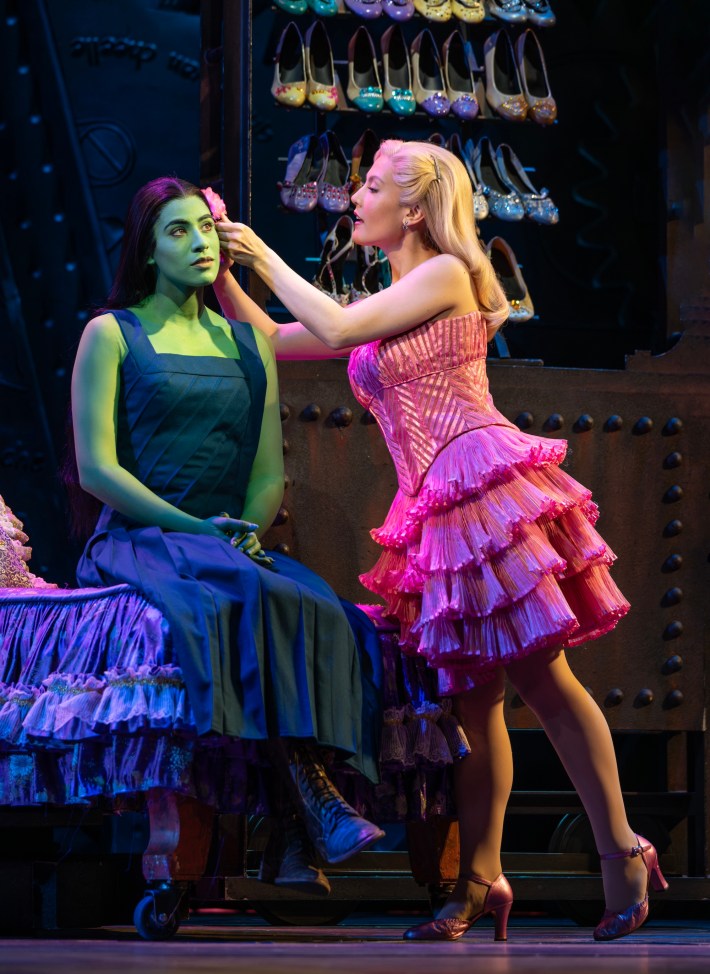Wicked
Tulsa Performing Arts Center
May 31, 2025
Look. I was a Wicked virgin before this. And no, that doesn’t mean what you think it means.
It means I had never read the book, seen the stage musical, or seen the movie, though I had seen approximately six million versions of the “holding space for the lyrics of Defying Gravity” meme, and Cynthia Erivo’s green-point’d index finger held by Ariana Grande’s spectral hand.

The most I had listened to was Defying Gravity—a stellar song by any measure—over and over. By listen Number One Thousand, I felt that it didn’t matter that I hadn’t seen Wicked; I already knew it in my heart. She defies gravity! She’s not supposed to defy gravity. The musical obviously ends after the song does.
I love being wrong! Not only does that song happen only halfway through the musical, but there are far more disturbing twists revealed throughout the run of the show. If, in your future watchings of The Wizard of Oz, you want to always feel “oh, that’s really weird” about every single character, this is the musical for you.
In this North American touring production of the Broadway show, Jessie Davidson is terrific as Elphaba, pushing her green character to their necessary fever pitches. The climaxes of “Defying Gravity,” some of the best and most emotive stage-rock there is, are made all the more impressive by watching her perform them in real time, floating above the cast, her great warlock’s robe cast down like a curtain over the stage. Davidson’s Elphaba, forced into impossibly difficult scenarios, acts them out with a humanity that muddies the character’s inherent otherness.

Then there’s Zoe Jensen’s Glinda (or Galinda, depending on which part of the musical you’re watching), who glides and cavorts with an exaggerated effortlessness which amps up the try-hard nature of Oz’s number-one annoying-but-genuine it-girl. In Jensen’s expressive face, the twists and turns of Glinda’s betrayal and redemption are believable and affecting, even from the balcony. Jensen’s ability to fill a space with just the right amount of line emphasis kept me laughing and frustrated: in her portrayal, the do-good character of Glinda the Good is complicated and human.
The staging is gorgeous. The Wizard’s big techno-face is appropriately terrifying, before The Wizard (acted with a hilariously milquetoast power by Blake Hammond) walks out onto the stage. The stage itself becomes a foggy forest in a surprisingly steamy scene between Elphaba and Ethan Kirschbaum’s Fiyero, who cavorts over statues, school desks, and castle battlements. High-caliber production values reign throughout nearly every aspect of the show, from the set design to the costumes, which are pitch-perfect to each character.
I struggled to hear some of the dialogue, as the audio engineering throughout the show put the voices quite low in the mix among the instruments. The actors’ lines were sometimes frustratingly drowned out in favor of the pit orchestra—which, by the way, was excellent. Still, I would have preferred to expend less effort to hear the characters speak.
Regardless, this show is a delight from beginning to end. Kids will love the straightforward scenes and likable characters; adults will appreciate the depth and breadth of the conflict and the complications of the original material from The Wizard of Oz. I can see why this is often called one of the best musicals of all time. You might think you know this show, but you don’t until you see it.






